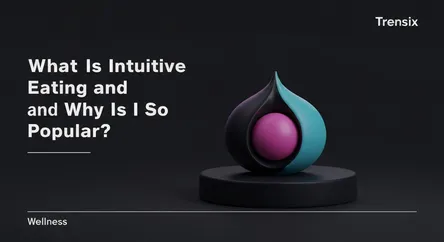Wellness
What Is Intuitive Eating and Why Is It So Popular?

Ditch the diets. Learn about intuitive eating, an approach that focuses on trusting your body's internal hunger cues to build a healthier relationship with food.
What is it?
Intuitive eating is an anti-diet philosophy that promotes a healthy relationship with food and body image. It's an approach that teaches you to trust your internal hunger and fullness cues to guide your eating choices, rather than following strict diet rules. The core idea is to reject the "diet mentality" of labeling foods as "good" or "bad" and instead give yourself unconditional permission to eat what your body desires. This framework encourages distinguishing between physical hunger (the biological need for nutrients) and emotional hunger, helping you reconnect with your body's innate wisdom.
Why is it trending?
Intuitive eating is gaining traction as a powerful antidote to the pressures of modern diet culture. Many people are exhausted by the cycle of restrictive dieting and the negative feelings of guilt and failure that often accompany it. This has led to a cultural shift towards body positivity, self-care, and mental well-being, for which intuitive eating is a natural fit. The movement, which has existed since the 1990s, has seen a recent surge in popularity, amplified by social media platforms where individuals are sharing their journeys toward food freedom.
How does it affect people?
Adopting intuitive eating can lead to significant psychological and physical benefits. Research has linked it to improved self-esteem, better body image, and reduced rates of depression, anxiety, and disordered eating. By removing the stress and guilt associated with food, people often experience more enjoyment from eating and less emotional eating. While not a weight-loss plan, studies show it can help with weight maintenance and is associated with improved cholesterol levels and a more stable metabolism. Ultimately, it empowers individuals to build lasting trust with their bodies.